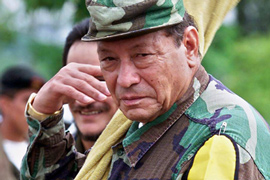Colombia’s Farc appoints new leader
Group’s choice of Alfonso Cano raises hopes hostages could be released.

Published On 7 Jun 2008
| In depth |
|
|
Mariana Sanchez, Al Jazeera’s correspondent in Bogota, said: “Alfonso Cano is more of a politically orientated rebel – he’s an ideologue, but he’s also a hardliner.
“He is the leader now but there are seven members of the [Farc] secretariat, and some of them are militarists. They would rather have that military approach as Farc has had with the Colombian government for the past few years.
“It is hard to say which direction Farc will take now,” she said.
‘Door of peace’
Cano, whose real name is Guillermo Saenz Vargas, is believed to be 50-years-old.
He studied anthropology at one of Colombia’s most prestigious universities before joining the Young Communists.
He is thought to have entered Farc’s ranks in the late 1970s.
Cano was placed in charge of the Farc’s clandestine political arm, the
Clandestine Communist Party of Colombia, when it was created in 2000.
Clandestine Communist Party of Colombia, when it was created in 2000.
The party continues to have a presence in Colombian cities, particularly among university students.
Juan Manuel, the Colombian defence minister, called on the new Farc leader to enter into negotiations and abandon the group’s armed struggle which he said had come to nothing.
“This is a message to Alfonso Cano, the government has always kept open the door of peace,” Santos told a press conference on Sunday.
“Three of your leaders are under ground, use this opportunity to demobilize, otherwise we will pursue military operations with more intensity,” he warned.
Adam Isacson, a Colombia analyst for the US based Centre for
International Policy, says the Farc is at a “fork-in-the-road moment”.
International Policy, says the Farc is at a “fork-in-the-road moment”.
Isacson says it is significant that the Farc’s new leader is not from the group’s military wing, which is thought to be more resistant to the idea of talks with the government.
‘Terrorist philosopher’
Two weeks ago, Alvaro Uribe, Colombia’s president, called Cano a “terrorist who poses as a philosopher”.
The confirmation of Maulanda’s death has prompted speculation that the group might release hostages.
Uribe said in a televised speech on Saturday that some Farc leaders are ready to free high-profile hostages such as Ingrid Betancourt, a former Colombian presidential candidate who holds French and Colombian citizenships.
The government said earlier that Marulanda’s death “would be the hardest blow that this terrorist group has taken, since ‘Sureshot’ was the one who kept the criminal organisation united”.
The Farc, South America’s longest-running and largest resistance group, are believed to hold an estimated 750 people hostage.
Uribe said on Saturday that some Farc leaders had called him to announce their decision to leave the group and release Betancourt if their freedom is guaranteed.
“The government’s answer is ‘yes, they are guaranteed freedom'” if they handed over hostages, Uribe said.
Uribe said those leaders of the Farc who free the captives could be turned over to authorities from “France, so that they enjoy that freedom there”.
Bernard Kouchner, the French foreign minister, called Uribe’s comments “very good news” but expressed concern that Bogota may be preparing to launch an army assault on Farc territory.
 |
| Marulanda was said to have never set foot in the Colombian capital [AFP] |
As well as Betancourt, the Farc hold three US nationals and dozens of Colombian police and military staff.
They want to swap the hostages for about 500 imprisoned comrades including three who are in US jails.
Betancourt has been held captive since 2002 when she was seized by the Farc while campaigning for the presidency.
In Paris, Betancourt’s mother and sister immediately launched a fresh appeal to the new Farc leader to release the former politician.
Such a release would “trigger decisive action from France and the international community to reach a humanitarian accord and put Colombia on the path of peace”, their statement said.
Source: Al Jazeera
